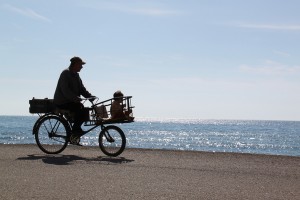Tripoli is a family city. Not in the same way as Copenhagen, with its wide pavements and pram-friendly metro. But a whole family will pile onto a moped and head out for an evening jaunt with the same ease as the Danes will stow their kids in a bicycle buggy and ride off along the canals, albeit more precariously.
It’s a far less pretentious city than the Lebanese capital and not remotely cosmopolitan. In fact after six months in Beirut I feel like I am now on an excursion to a foreign country. There are no would-be Western cafés, no macaroons in the sweets parlours and no leopard print miniskirts.
In fact on the door of one store in the beautiful if run-down old town, pictogrammes demonstrate approved attire for women: basically an A-line covering from the crown of the head down. Further pictures on the poster show female figures wearing headscarves but with waisted outfits accompanied by the stern warning “This is not hijab.”
Nevertheless, out on the street the full-length veils are intermingled with jeans and little summer dresses worn as tunics over the usual demure wrist to ankle covering.
The gender divide is certainly more evident than in Beirut. Men spend their days wheeling around stalls piled high with loquats or broad beans or clinking through the souq selling coffee from tall silver pots. Others edge their pistachio green Mercedes down the taxi rank manually to save fuel while waiting for their next client. When not working they watch the world go by or group together in austere cafés devoid of women and play backgammon. Meanwhile, the women appear more sporadically from their homes, hanging out washing, dashing out with prams on the school run, nipping out for groceries.
But on Fridays, the population of Tripoli recondenses into family units. Instead of Copenhagen’s canals, Tripoli has the corniche, a long promenade along the coast of the annexed town of El Mina (the harbour). On a hot evening, families stream out of the city to stroll along concrete jetties by the sea, savouring the breeze, eating corn on the cob and drinking thick coffee.
The corniche is lined with VW campervans, many painted the same green shades as the taxis. Symbolic of exploration and self-sufficiency among the free and single in other climes, here it evokes the essence of inter-dependency, as a base for extended family picnics – or even a business, another favourite family activity for the Lebanese.



Yes, it sounds like a foreign, and undeniably lovely place. I haven’t been to Tripoli in years.